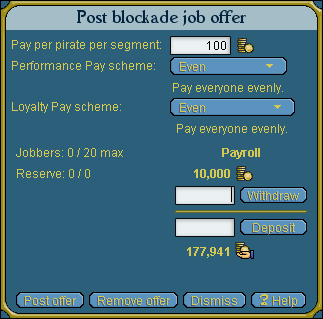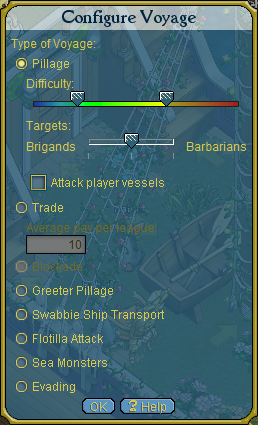Official:Blockades
Blockades
Introduction
Seizing control of an island is one of the greatest challenges in Puzzle Pirates.
To take control of an Island and install a new Governor, a Flag, or more commonly a coalition of Flags, must blockade their target island. A successful blockade involves substantial coordination of pirates, vessels, and material. However, the rewards can be substantial. The governor of an island controls the economy of the Island they rule.
A Blockade is essentially an extended, multi-party sea battle in which teams battle for domination of a map detailing the waters around an Island. Blockades can often run for an extended period of time. As a result, they are generally scheduled ahead of time and tend to occur during times when the greatest number of players will be able to participate.
Contents
The remainder of this document covers how to set up and run a blockade. See Blockade Action for more on how you can participate in a blockade.
Other Kinds of Blockades
In addition to Blockades to take control of an Island, there are also two other types of Blockade activities in which players can participate:
Brigand King Blockades
Event Blockades
Declaring a Blockade
An island can only be conquered when it is open for blockading. You can find out if a given island is open for blockades by looking at the blockade tab on the notice board while standing on the island.
A Royalty member of a Flag with sufficient fame, can declare the intent to Blockade from a vessel ported at that island. To do so, press the Blockade button, which will then prompt you to pay the "war chest" fee.
The war chest is the amount required from a Flag as a "deposit" on the blockade they are planning.
- For uncolonised islands, the war chest is a flat amount dependent on the size of the island.
- Outposts cost 25,000 pieces of eight, and can only be blockaded by flags of at least Noted fame
- Medium islands cost 75,000 pieces of eight, and can only be blockaded by flags of at least Established fame;
- Large islands cost 125,000 pieces of eight, and can only be blockaded by flags of at least Renowned fame.
If the Island is already colonised, the Flag must first declare war on the present ruler of the island, and the cost of the war chest will have an additional fee based on the island's population. The total cost to blockade a colonised island is viewable from the "Blockade Status" section of that island's Notice Board.
Remember that declaring war can be tricky based on those flags' alliances. See the "Alliance Webs" section in the Flags documentation. Declaring the blockade broadcasts an announcement to the entire Ocean and begins the notice period, which is usually 24 hours.
Rounds
A blockade is split into five rounds. Each round is 45 minutes long. After each round is a rest period of 15 minutes. During the rest periods flags are cleared from the board, but vessels may still battle. At the beginning of the next round all ships are moved off the board and the vessels must re-enter to claim the newly-placed flags. The winner of the round is the faction that scores the greatest number of points in that round. In order to win a blockade, a Flag must be a Contender (have paid the war chest) and win the majority of the five rounds. Thus, if one faction wins the first three rounds, the blockade is finished.
Factions and Contenders
The Blockade groups Crews and Flags together into factions for scoring. The first Flag in an alliance that enters the blockade will establish a faction under its name, such that any of its allies that later enter the blockade will be grouped under it and score with it.
In order to win round points and have a chance at winning the Island a Flag must declare itself a Contender. This is done by pressing the 'Blockade' button from the vessel panel as described above -- you must be royalty in the flag, have declared war upon the island's current owner, if any, and must also pay the required War Chest to declare your contention. Choosing to contend the blockade effectively starts a new faction, so any points in the current round scored before declaring contention are abandoned, and all ships who would be within your new contending faction must leave the blockade board and re-enter to join the new faction. Only contending factions win round points; if a non-contending faction wins the round it scores the round for the defense. The faction with the largest number of flag points at the end of the round wins, however, so defenders are wise to draw their allies into a single faction to aggregate their points. Even outside the blockade, pirates may check on the status via the noticeboard.
Sinking and Non-Sinking Blockades
If the defending flag reciprocates the war declaration with any Contender, or if there is no defending flag in the case of an uncolonised island, then the blockade will be a sinking blockade. All vessels in a sinking blockade are at risk of sinking should they hit full damage. If the declaration of war is not reciprocated then the blockade will be a non-sinking blockade. In such battles when a ship reaches full damage it is ejected from the blockade to the port or sea, depending on where it entered, and cannot re-enter the blockade during the same round or future rounds. Whether a blockade is sinking or not sinking is decided at the beginning of each round, thus if the defender, for example, rescinds its state of war with the contender then the next round will be non-sinking.
Creating a Blockade Job
Flag royalty may post job offers for their flag in a blockade from the "Blockades" tab of the notice board. Essentially, these offers allow the flag to pay all dutying pirates aboard their vessels within the blockade based on a selected payscale.
There are a few options available to configure the blockade job. First, the pay per pirate per segment can be set. This is the average amount pirates will be paid at each duty report. Second, several pay schemes are available to divvy pay amongst the pirates in the blockade. Based on these, some pirates may receive more pieces of eight than the average, some may receive less.
Performance Pay Scheme:
- Even - Everyone receives equal shares.
- Performance - Pirates with better duty reports receive more.
- Elite - Extreme version of Performance.
- Gunners' Glory - Gunners receive extra pay.
Loyalty Scheme:
- Jobbers' Delight - Pirates from outside the flag are paid extra.
- Jobbers Only - Only pirates from outside the flag receive pay.
Once a job offer is posted, pieces of eight may be added to the payroll for that job offer. Only the pirate who created the offer may withdraw from the payroll, and he or she will be returned any excess when the blockade ends. In order to ensure timely payment of blockade jobbers, the payroll will keep in reserve enough pay to cover a full blockade round for each jobber. This means that new jobbers will not be able to join if there is not enough in the payroll.
The Blockade Job Offer panel provides information on current jobbers in the blockade. "Jobbers: 12 / 34 max" means that there are currently 12 jobbers in the blockade and the current payroll can support up to 34. "Reserve: 1000 / 1200" means that the payroll currently has 1000 pieces of eight reserved to cover jobbers active in the blockade, and that it would need a total of 1200 to fully cover the current jobbers. Any pieces of eight deposited in the payroll will first be used to cover the 200 needed by the reserve. If the payroll cannot fully pay the jobbers after any blockade segment, they will be paid as much as possible and will be told about yer financial status.
In order for the pirates aboard a vessel to get paid, that vessel's officers must configure it to "Blockade" from the "Configure Voyage" panel. If they also wish for a notice to be placed on the Voyages tab of the notice board, the ship must be set to "Hiring jobbers" in the Vessel tab on the vessel as well. Any such notice will only appear if the flag has enough pieces of eight set aside in the payroll to cover a new jobber joining the blockade.


